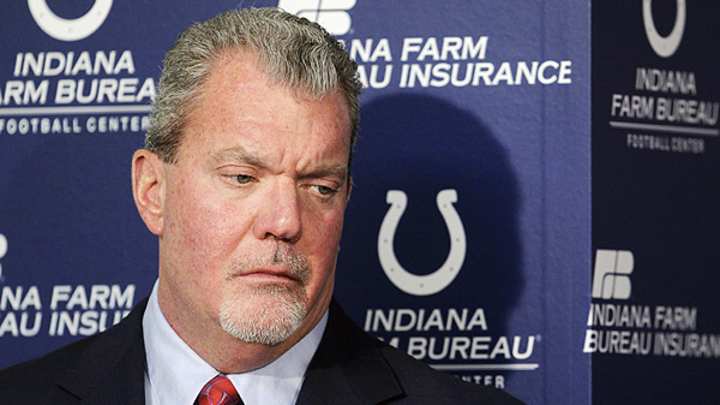Jim Irsay's refusal to apologize a disservice to Indianapolis Colts fans, himself

'If there's something I have to apologize for, I would,' Jim Irsay said, 'but at this point, it wouldn't be appropriate.' (Darron Cummings/AP)

When his Colts were blown out in a meaningless preseason game last August, most of the damage done after Chuck Pagano had pulled Andrew Luck and the starters, Jim Irsay issued an apology via Twitter to the Indianapolis fans. He did the same thing back in 2011, after a humiliating 62-7 loss to New Orleans in the midst of the Colts' 2-14 campaign.
"Apologies 2 all ColtsNation," read part of Irsay's tweet in the latter instance. "[P]roblems identifiable; solutions in progress but complex in nature/better days will rise again."
He has yet to deliver the mea culpa that would mean the most.
Irsay was arrested back in March on charges that initially included four counts of felony drug possession. Eventually, he was formally charged with one count of operating a vehicle while intoxicated and another of operating a vehicle with a controlled substance in his body.
MORE COVERAGE: Offseason Report Cards | NFL Power Rankings | 2015 NFL Mock Draft
In an exclusive interview with the Indianapolis Star's Bob Kravitz, the Colts owner passed on an opportunity to express remorse.
"I don't think that's something I'll address right now," Irsay told Kravitz. "There are certain things I want to say that I can't say. We need to let the process go forward and I'll address that later. I'm a human being; if there's something I have to apologize for, I would, but at this point, it wouldn't be appropriate. It sets me up, like if you don't say you're sorry, then why aren't you saying you're sorry, and if you say you're sorry, then you must have done something wrong."
An initial hearing in Irsay's case is scheduled for June 19. To some extent, that impending event offers an explanation for why Irsay would prefer not to dive too deep into details or admit guilt.
Quite honestly, though, he owes more to the Colts fan base.
During his two-hour discussion with Kravitz, Irsay called the whole situation "a blessing" and declared that "in some ways, [going through rehab] is my greatest moment. It takes courage to try and overcome the difficulties you have.
"When someone beats cancer," Irsay continued, "it's like, `Wow, that's so heroic,' but when someone has this illness, it's treated like you're a leper because that person is morally corrupt, and that's not the case."
Addiction, of any sort, can be a hellscape. If you have been through it, or are close to someone affected by those demons, you know how painful taking that first step -- and asking for help -- can be. If his March arrest somehow led Irsay to the path required for him to better control his problems with painkillers, then it may indeed be one of the critical turning points of his life. Certainly, he, his family and the Colts organization would have brighter futures if Irsay stays clean.
But he made a mistake.
"Being an owner, I hold myself to the highest of standards," he told Kravitz. "As a father, as a grandfather, as someone who by nature of their work has this public stage, my nature is to always take that standard seriously."
The refusal to apologize runs in stark contrast to those words. There is a way to say "I'm sorry that this happened" without burying himself in the eyes of the court or casting himself as a villain. Players are held accountable when they slip up. Coaches, too. Irsay is not exempt of those expectations simply because he stands in a position further up the totem pole.
When does it become fair to expect him to react as such?
The answer may lie in a larger discussion about addiction and mental health, one that Irsay and so many others have pointed out we often shy away from as if it's taboo. Irsay, per Kravitz, attends meetings of Alcoholics Anonymous on occasion, an attempt to manage another problematic aspect of his past. Step 1 of that group's 12-step recovery process is admitting a problem; Step 8 is making amends.
Hopefully, some day soon, Irsay gets to the point where he can tell Colts fans he's sorry for screwing up. Irsay wants everyone in his corner as he works through his problems, and there can be no faulting him for that desire. Before that occurs, however, Irsay first needs those closest to him -- be it his friends, family or fans -- to look beyond his transgression to see the progress he's made in the aftermath.
